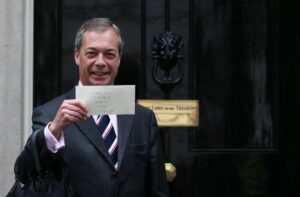Why the Tories should not rush to appoint a no-deal Brexit leader

We have long argued that a no-deal Brexit would be bad for business, and for the country. But the self-titled party of business seems most likely to appoint the ‘f**k business’ candidate, Boris Johnson, as its leader. If he takes a hard no-deal stance, it would be a mistake both for the country and for his party.
The great advantage of having Nigel Farage’s Brexit party in recent electoral mixes is that it has served to properly illustrate the lack of support for a no deal Brexit – despite the headlines elsewhere.
Farage points out that his voters are the people who feel ‘angry and betrayed’ by traditional politicians who have failed to deliver ‘the Brexit you voted for.’ And the fact that Farage is standing on one policy alone – a ‘no deal’ Brexit – serves as a focus for all those angry and betrayed voters. In the European and Peterborough elections, the new party polled an impressive-sounding 32% and 29% respectively, winning the first poll and coming close in the second.
But there is one unsettling fact for Nigel Farage: by-elections and European elections are traditionally great places to register protest votes, and these were the mother of all opportunities to mobilise his supporters. And yet, given that turnout for the European elections was 37%, and for the by-election 48% – both massively down on either a general election or the referendum – they still failed to demonstrate a majority appeal. The European election result indicated that, nationally, around 13% of registered voters actually voted for ‘no deal’; in Peterborough, that figure stands at 15% – in a borough that in the referendum voted 61% in favour of Brexit.
In hard figures, across Peterborough, 53,216 voted for Brexit in 2016: 10,201 voted for ‘no deal’ Brexit parties yesterday. In effect, when faced with a choice between Brexit 2016-style, and the more radical no-deal Brexit being proposed now, 80% of 2016 voters either abstained or voted another way.
The desire for an orderly exit is similarly borne out by yesterday’s figures. Both the Labour and Conservative parties stood on a platform of a managed exit (as outlined in their 2017 manifestos), and they took 52% of the Peterborough vote. The ‘remain’ parties – Lib Dem and Green – garnered 15% between them.
In the European elections, widely seen as a protest vote from which inbetweeners stayed away, the no deal vote was 34% (Brexit and UKIP), the ‘Remain’ vote 40% (Lib Dem, Green, Change UK, SNP, Plaid), and the ‘managed exit’ vote a less convincing 23% (Labour, Tory). But – if we accept the proposition mooted by Farage that the anger is so deep among no-deal Brexiteers that they would all turn out to trounce the mainstream – we can expect that their numbers will not massively increase in absolute terms in a general election. In fact, it is likely that with other considerations (education, NHS, etc), people would vote more moderately in a national election. Yet the figures are stark: 17.4m people voted for Brexit in 2016 – but fewer than 6m people voted nationally for no deal Brexit parties in the European elections – a fall of 65%.
So it would appear that what moderate Brexiteers say is true: the vast majority of people who voted Leave in 2016 did not vote for ‘no deal’: they voted for a managed exit and the ‘exact same benefits’ (or as close as can be reasonably managed) that they were promised. When the reality of no deal is exposed, they are distinctly less enthusiastic.
If the Tories rush to install a ‘no deal’ Prime Minister, they will be bowing to the constant drumbeat of around 15% of the electorate. Not only would it be an economic catastrophe for a new Tory leader to pursue a hard exit on 31st October, it would be profoundly anti-democratic. And voters would not easily forgive the party that delivered it.
Martin Tripp
Martin Tripp Associates is a London-based executive search consultancy. While we are best-known for our work across the media, information, technology, communications and entertainment sectors, we have also worked with some of the world’s biggest brands on challenging senior positions. Feel free to contact us to discuss any of the issues raised in this blog.